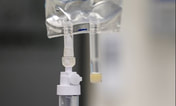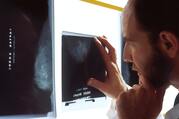Read these publications from patients, physicians, scientists and experts.

Radiopharmaceutical administration practices - Are they best practice: The nuclear medicine community has stated that they are using best practices to gain venous access and administer radiopharmaceuticals, and therefore do not contribute to extravasations. We tested this hypothesis qualitatively and quantitatively by evaluating four different perspectives of current radiopharmaceutical administration practices.

NRC: be straight about when clinicians need to report errors that lead to radiation exposure: David Townsend is the co-inventor of the PET/CT scanner. Daniel Fass is a radiation oncologist at South County Health in Rhode Island, CEO of Medpark U.S., and an assistant professor at Weill Medical College of Cornell University. Their piece in STAT discusses the flawed NRC decision requiring patients to report their extravasations.

Frontiers in Nuclear Medicine: From the patient perspective, transparency regarding extravasations is essential to improving care, ensuring radiation protection, reducing health inequities, and untangling the deeply disturbing and irregular relationship between the nuclear medicine community and their regulating body, The U.S. Nuclear Regulatory Commission.

The ASCO Post: Pam Kohl has been living with metastatic breast cancer for 5 years. She receives a bone nuclear imaging test every 3 months. During one of these scans, she experienced an extravasation, which can distort the quality of the image, rendering it inaccurate.

Ethics and Medical Radiological Imaging: A World Health Organization (WHO) Policy Brief: Medical imaging is universally accepted as an essential tool in health care. Yet, unlike most of medicine, its patient safety practices draw on the system of radiation protection, as opposed to that provided by medical ethics.

NRC Petitioned by Patient Advocacy Group to Require Reporting of Extravasation: Article in HealthImaging about the Information Correction Request submitted to the NRC requesting that the commission correct their policy that exempts providers from reporting accidental patient exposures—specifically extravasations.

Let’s Close This Safety Loophole in Cancer Care: A radiation oncologist, medical oncologist and patient advocate co-authored this compelling opinion piece in The Cancer Letter weekly news publication.

Nuclear Regulatory Commission’s Foot-Dragging on Patient Irradiation Suggests Regulatory Capture: In this opinion article in the science and medical publication STAT, a 40-year oncologist details the long history of avoiding oversight in the nuclear medicine community and the need to change the NRC rules of reporting.

Nuclear Medicine Extravasations - Patients Have a Right to Know: In this opinion piece for Patients Rising, the chief of molecular imaging at a major Virginia health system argues for new NRC rules and greater transparency for patients.

Extravasation Reporting: The Scientific Case for Regulatory Change: In this article in the radiology publication InPractice, the co-inventor of the PET/CT calls on the Nuclear Regulatory Commission to protect patient safety by updating their 1980 rule and requiring the reporting of significant extravasations.

Detection of Excess Presence of 99mTc-MDP Near Injection Site—A Case Report: An article in Frontiers in Medicine lays out the evidence that extravasations during nuclear scans cause patient harm and irradiate their bodies with dose of radioactive drugs that exceed the reporting limits for medical events.

Raising Standards for Cancer Care: Jackson W. Kiser, MD, Chief of Molecular Imaging at Carilion Clinic in Roanoke discusses how Carilion Clinic reduced its extravasation rates and believes significant extravasations should be reported just like any other medical event that exceeds NRC reporting limits.

The Scientific and Clinical Case for Reviewing Diagnostic Radiopharmaceutical Extravasation Long-Standing Assumptions: A literature review finds that significant extravasations can or have caused patient harm and can irradiate patients' tissue with doses that exceed medical event reporting limits.
The Scientific and Clinical Case for Reviewing Diagnostic Radiopharmaceutical Extravasation Long-Standing Assumptions: A literature review finds that significant extravasations can or have caused patient harm and can irradiate patients' tissue with doses that exceed medical event reporting limits.

Assessing and Reducing PET Radiotracer Infiltration rates: An actionable quality improvement plan to reduce potentially compromised injections, and compare injection scoring to PET/CT imaging results.
News Releases
NIH SUPPORTS OBJECTIVE DOSE-BASED
EXTRAVASATION REPORTING
EXTRAVASATION REPORTING
